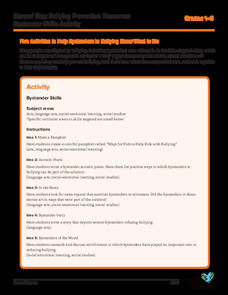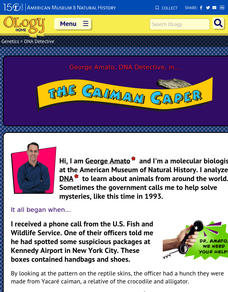Thoughtful Learning
Using Perspective Shifting to Persuade Readers
One of the key competencies of social and emotional learning is social awareness and being able to see things from another's perspective. This ability to shift perspective is particularly important when crafting an argument to persuade...
Committee for Children
Five Activities to Help Bystanders to Bullying Know What to Do
Five activities covering ELA, social studies, and social and emotional learning offer bystanders tips and the courage to help individuals being bullied. Activities include writing an acrostic poem, creating a pamphlet, reading current...
PBS
Why Should Women Vote? The Suffrage Question
An online interactive activity asks learners to analyze a group of documents related to the women's suffrage movement and then place the documents on a timeline. The results assess users understanding of the progression of the women's...
University of California
Breathing Boards
Instill the importance of mindfulness with six breathing exercises. Scholars trace shapes using their fingers, following arrows that tell them when to breathe in and when to breathe out. Exercises increase by counts of breath in and out.
University of California
re:Write Journaling as Healing
Sometimes a person needs an ear unattached to a mouth, a place to vent or clarify emotions. Journals are a great way to offload or gain insight into mixed emotions. The trick is to find a starting point. This list of 30 journal prompts,...
American Museum of Natural History
What do You Know About Life on Earth?
Humans have only inhabited the earth for a fraction of the time that life has existed. Young scientists explore the facts about the emergence of life on Earth with an interactive resource. While highlighting different types of life, the...
American Museum of Natural History
DNA Detective
Match up the DNA code. Pupils read the website from the American Museum of Natural History about how DNA can determine whether a skin is from a particular type of reptile. Using the same technique, learners match up products with the...
Corbett Maths
Fractions Shapes
Let the class color. The video shows two different types of fraction of shapes problems. Pupils learn to shade a given fraction of a shape along with determining the fraction of a shape that is shaded. Learners practice the skill with...
American Museum of Natural History
What do you know about Biodiversity?
What do your classes know about biodiversity? A 10-question online quiz asks questions related to biodiversity and species groups. As learners answer questions, they click on links to additional information. The lesson could be an option...
American Museum of Natural History
What do You Know About Marine Biology
Show me what you know about the sea. Learners answer 10 questions about marine biology. The questions range from what evidence points to the origin of life to the biggest threat to oceans.
American Museum of Natural History
Find My Plankton Baby Picture
Get a better understanding of babies in the sea. The class learns about the two kinds of plankton. They then determine the baby pictures of eight marine animals given a picture of the adult and some hints about the larvae. When scholars...
American Museum of Natural History
Dive Into Worlds Within the Sea
Make connections between ocean organisms. Individuals explore three different ecosystems in the ocean. With an online interactive, they learn how different organisms depend upon each other. Learners first answer questions to connect...
American Museum of Natural History
Journey to the Bottom of the Sea
Follow the path to the sea floor. Pupils play an online interactive board game to reach the bottom of the sea. Participants must match descriptions of creatures to a property of water dealing with oxygen, food, light, or density to move...
American Museum of Natural History
What Do You Know About Genetics?
Just what do you know about genetics? The online resource contains 10 questions about genetics. Scholars work through the questions ranging from what DNA stands for to how much of human DNA is similar to that of a fruit fly. Scholars...
American Museum of Natural History
A Nature and Nurture Walk in Mendel Park
We are what we make of ourselves ... sometimes. Learners play a game to come up with the answer to a riddle. The game consists of determining whether different scenarios are due to nature or nature and nurture. With each correct answer,...
Corbett Maths
Reciprocals
Reciprocals is more than just flipping a fraction. Pupils watch a video to see how to find the reciprocal of any number. Individuals practice finding reciprocals of numbers including whole numbers and decimals.
Corbett Maths
Increasing or Decreasing by a Fraction of a Quantity
Calculate fractional changes in numbers. Pupils watch a short video on determining the cost of a shirt after it has been reduced by a fractional amount. Scholars use worksheets to practice calculating increased and decreased amounts.
Corbett Maths
Mixed Numbers to Improper Fractions
Mix things up a little to be improper. The presenter shows three example of changing a mixed number to an equivalent improper fraction. Scholars work several practice problems and application questions to refine the process.
US Department of Commerce
Where to Next?
Salary, education, census statistics ... how do people choose their careers? Scholars complete worksheets and rely on census data to determine their career aspirations. Then, pupils conduct Internet research about places they would...
Corbett Maths
Simplifying Fractions
Put fractions in simpler terms. Learners watch a video showing how to simplifying fractions. They then work through two worksheets to practice the skill.
Corbett Maths
Improper Fractions to Mixed Numbers
What's the proper way to convert fractions? A short video shows three quick examples of converting an improper fraction to a mixed number. Pupils practice doing their own conversions to better understand the skill.
Corbett Maths
Multiplying Fractions
Multiply straight across. A video shows straightforward examples of multiplying fractions by multiplying the numerators and the denominators. Pupils practice the skill and give their answers as simplified fractions.
American Museum of Natural History
Express Yourself
Emotions are written all over your face. Pupils match six emotions with full facial expressions in an engaging online interactive. The scholars move on to align the same six emotions with only the expressions from the eyes by dragging...
Education Bureau of Hong Kong
Decision-Making
Designed to be included in the fourth lesson in the "Learning and Teaching of Critical Thinking Skills" series, this presentation models for viewers how to use the Decision Making worksheet to weight factors.

























